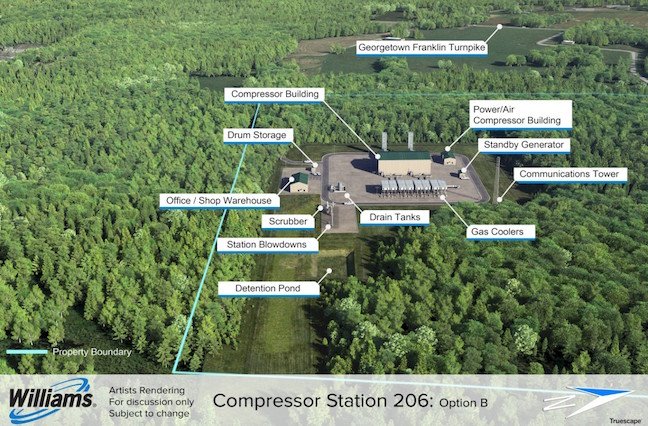Six Of 12 Transco Environmental Permits Deficiencies Tied To Gas Compressor Station

The proposed gas compressor station, targeted for a 52-acre site along Route 27, near Little Rocky Hill. Graphic: Williams-Transco.
Half of the deficiencies that threatened to scuttle necessary state environmental permits for a natural gas pipeline project, before an 11th-hour withdrawal of the permit applications, were connected to the part of that project which falls in Franklin Township.
The township is slated to be home to a 32,000-horsepower gas compressor station, part of the Williams-Transco Northeast Supply Enhancement Project, which includes miles of new gas pipeline to be laid in Middlesex County and in the Raritan Bay.
The state Department of Environmental Protection identified 12 deficiencies with the applications, six of which related to the proposed gas compressor station. Those six deficiencies identified by DEP – which were leading to a potential state rejection of the permits – included potential erosion damage to properties next to the proposed gas compressor site on Route 27, compliance with state water quality standards relating to stormwater runoff, the treatment of stormwater runoff from the site’s access road and proof of Williams-Transco’s claim that a proposed water retention basin will achieve a 90 percent rate in removing the amount of solids in water than can be trapped by a filter.
All of those deficiencies – including verification from the federal government that the project was in the public interest – were detailed in a June 15 letter from the DEP’s Christopher Jones to a contractor working for Williams-Transco.
The DEP’s letter was written one day after Williams-Transco formally withdrew its permit applications. The state had until June 23 to issue a decision on the permits.
Transco re-submitted the applications for an Individual Freshwater Wetlands Permit, Flood Hazard Area Verification and a Flood Hazard Area Individual Permit on June 18, which gives the state another year to make a decision. Transco was directed in the June 15 DEP letter to address the dozen deficiencies in the original applications.
Williams spokesman Christopher Stockton confirmed that happened, writing in an email that the resubmittal “is the same application but has been updated to address the deficiencies identified by the agency.”
Stockton said that neither the scope of the project nor its timelines – it hopes to have the compressor station operating by 2019 – have changed with the resubmittal.
The Northeast Supply Enhancement Project is a $1 billion, multi-state proposal to lay new natural gas pipeline and build the gas compressor station near the Trap Rock quarry operation on Route 27.
The gas compressor station has been intensely opposed by township and South Brunswick residents, and a coalition of environmental groups, who cite safety and environmental factors.
The six permit deficiencies identified by DEP relating to the gas compressor station are as follows, according to the June 15 letter:
- “Pursuant to N.J.A.C. 7:13-12.l(g)2, concentrated overland flow that causes erosion to property not owned by an applicant is considered an adverse impact to that property. Transco is proposing to construct two (2) swales adjacent to the proposed Compressor Station access road. These swales would receive runoff from the access road, concentrate that flow, and then ultimately discharge the runoff onto the adjacent property not owned by applicant. This discharge has the potential to cause erosion on property not owned by the applicant. Transco must demonstrate that this runoff will not result in erosion or adverse impact to the offsite property. Additionally, Transco must submit information that demonstrates that it has consent to discharge the stormwater onto the adjacent property, or that is has obtained an easement or entered into an agreement to purchase the prope1ty pursuant to N.J.A.C. 7:13-12.l(f).
- “Transco has proposed a bioretention pond in the proposed Compressor Station site design. The submitted information does not identify the elevation of the seasonal high groundwater table as required by the Stormwater Management Rule and New Jersey Stormwater Best Management Practices Manual. Without the elevation of the .seasonal high groundwater table DEP cannot dete1mine whether the bioretention basin is designed such that the minimum required 2-foot separation from the bottom of the bioretention’s soil media to the seasonal high groundwater table has been attained as required by the Stom1water Management Rule and the New Jersey Stormwater Best Management Practices Manual. Please submit soil boring data that identifies the seasonal high groundwater elevation.
- “Transco must analyze the pervious and impervious surfaces separately to accurately compute the stonnwater runoff rates and volumes of the existing and proposed site conditions. The submitted calculations cannot be relied upon to demonstrate compliance with the water quality standards set forth at N.J.A.C. 7:8-5.5, and the water quantity and recharge standards set forth at N.J.A.C. 7:8- 5.4 because the analysis was not done in this manner. Please revise the calculations to analyze the pervious and impervious surfaces separately.
- “The stormwater runoff from the proposed compressor station and access road is conveyed to two distinct analysis points, the freshwater wetlands complex near Georgetown-Franklin Turnpike and the Tributary to Carters Brook. As such, Transco must demonstrate compliance with the water quantity standards for each distinct analysis point.
- “Transco has designed the proposed access road, such that stormwater runoff from approximately 72,000 square feet of pavement will bypass the proposed bioretention facility and not receive any water quality treatment. Transco intends to compensate for said bypass by capturing and treating runoff from the compressor station area. However, most of the compressor station area does not receive vehicular traffic (i.e. buildings, gravel area beneath the proposed compressor station equipment) and thus is considered clean. Therefore, capturing and treating runoff from these areas cannot be used to compensate for not treating runoff from the proposed access road. Additionally, please note the project must be designed to provide 80 percent TSS removal rate for two distinct analysis points, the freshwater wetlands complex near Georgetown-Franklin Turnpike and the Tributary to Carters Brook. Please submit a revised Stormwater management design that treats the 72,000 square feet of access road.
- “Transco has assumed the proposed bioretention facility will receive 90% TSS removal credit. However, to receive said credit, the proposed bioretention facility must be designed to have at least two feet of soil bed media and the basin must be planted as a terrestrial forested community (average of 1,000 stems per acre). As currently proposed, the basin does not satisfy this design criteria.”
Also identified in the letter as an impediment to DEP approval of the permits was the lack of a Certificate of Public Convenience and Necessity from the Federal Energy Regulatory Commission, which attests to a need for a project. The agency also noted that Williams-Transco had not yet demonstrated that the project would “meet the public interest under the federally authorized Freshwater Wetlands and Water Quality Certificate Standards,” according to the letter.
That FERC certificate is not due until the final Environmental Impact Statement is issued on Sept. 17, according to a schedule published by FERC on Jan. 3, 2018.
Williams-Transco also needs to show proof that it has permission from the owners of seven Middlesex County properties allowing for “construction, temporary access roads, staging areas, easement expansion, and new pipe line alignment outside of Transco’s existing right-of-way,” according to the letter.
Barbara Cuthbert, a member of the Franklin Township Task Force established to oppose the compressor station, said the group’s work continues.
“We’ll need to work with experts and folks who understand the permit application documents and maps to review new content,” she said in an email. “Williams/Transco likely still anticipates receiving FERC’s Certificate in December 2018, but they can’t do any construction until they receive all needed permits from NJ, NY and PA.”
Ed Potosnak, executive director of the New Jersey League of Conservation Voters – one of the environmental groups involed in the coalition opposing the project, said he was “pleased” that Transco withdrew its applications.
“The company saw the writing on the wall that the proposal was going to be denied, and that their incomplete application wouldn’t meet New Jersey’s high standards designed to protect our health and environment,” he said in a statement. “Their withdrawal is a win for our families and businesses, and it’s clear the refiling for authorization will have the same result a year from now as it does today: denial.”






















































